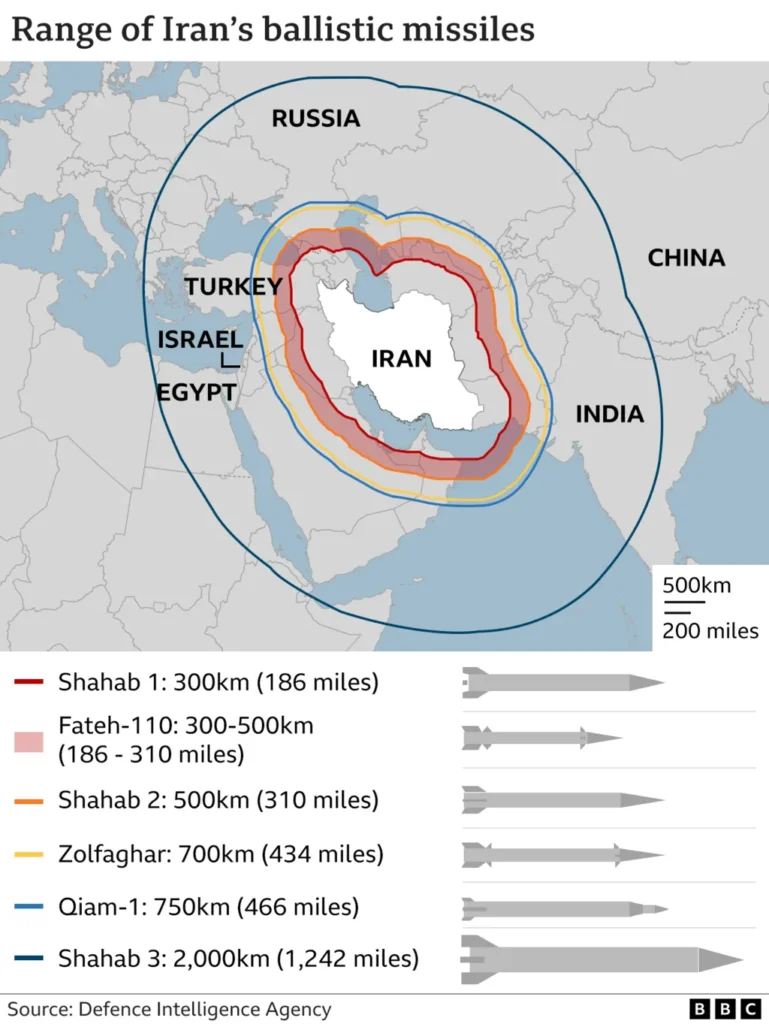Iran – Israel
In the wake of the recent missile attack by Iran on Israel, tensions in the Middle East have escalated once again. The attack, involving approximately 180 ballistic missiles, marked the second such strike from Iran this year, with significant repercussions expected. Israeli officials confirmed that some missiles hit targets in the center and south of the country, although many were intercepted by air defense systems.
Iran’s Revolutionary Guard Corps (IRGC) cited the attack as retaliation for Israel’s alleged killing of key commanders and political leaders in the region, including Hezbollah’s Hassan Nasrallah and IRGC commander Abbas Nilforoshan. While Israel has not confirmed involvement, these incidents are seen as part of the broader shadow war between the two nations, with Iran seeking to challenge Israel’s existence and influence.
The United States, a crucial ally of Israel, quickly responded, with President Joe Biden ordering U.S. forces to assist in defending Israeli territory. U.S. forces reportedly helped intercept some of the incoming missiles. Pentagon officials emphasized that this cooperation in missile defense would continue to shield Israel from further aggression.
Israeli Defense Forces (IDF) have already promised retaliation, with spokesperson Rear Adm. Daniel Hagari stating that the attack was a “serious” escalation, and that Israel remains on high alert. Hagari emphasized that Israel will respond at a time and place of its choosing, signaling the possibility of further conflict. U.S. Defense Secretary Lloyd Austin warned of “severe consequences” for Iran if further hostilities occur.
In the broader context, the Iranian missile attack underscores the long-standing geopolitical struggle between the two nations, with Iran refusing to recognize Israel’s right to exist and continuing its support for anti-Israel militias, including Hezbollah and Hamas. These paramilitary groups are part of Iran’s “Axis of Resistance,” which actively opposes Israeli influence in the region.

Despite the severe repercussions of this latest conflict, both nations remain entrenched in their respective stances. Israel considers Iran an existential threat, while Iran continues to leverage its influence across the Middle East, particularly through proxy forces and regional alliances. This shadow war has been characterized by covert operations, assassinations, and military escalations, with little sign of resolution in the immediate future.
Iran’s strike is viewed as a response to several high-profile assassinations, which it blames on Israel, further straining relations between the two powers. With both nations unwilling to back down, the potential for further military engagement is high, especially as both Israel and its allies have vowed retaliatory actions.
This confrontation also places pressure on the wider international community, particularly as it involves nuclear concerns surrounding Iran’s ambitions and Israel’s continued role as a dominant military power in the region. The United States’ involvement highlights the broader global ramifications, particularly with respect to military alliances and defense strategies in the region.
In summary, the recent missile attack by Iran has sparked renewed tensions in the Middle East, with both Israel and Iran preparing for further conflict. The U.S. stands firmly behind Israel, reinforcing its defense capabilities, while Iran’s actions reflect its ongoing strategy to resist Israeli influence through direct and proxy warfare. As both sides remain committed to their goals, the possibility of further escalation seems inevitable, with serious consequences for the region’s stability.
The missile attacks launched by Iran are part of a long-standing, high-stakes conflict between Israel and Iran, rooted in both geopolitical and ideological rivalries. Iran’s hostility towards Israel is tied to its goal of eliminating Israeli influence in the region and establishing dominance through proxy forces like Hezbollah and Hamas. Meanwhile, Israel views Iran’s actions as a direct existential threat. Both nations have engaged in covert operations and assassinations, with this latest attack escalating tensions. The use of ballistic missiles highlights the sophistication and severity of Iran’s military capabilities, posing a broader challenge to regional stability.

























